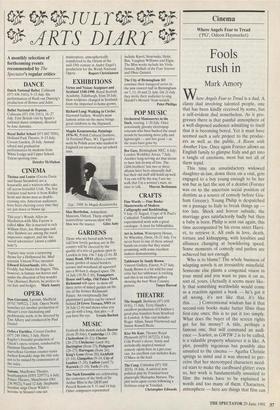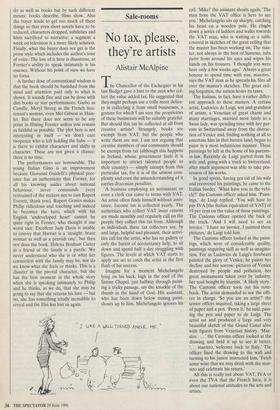Cinema
Where Angels Fear to Tread ('PG', Odeon Haymarket)
Fools rush in
Mark Amory
Where Angels Fear to Tread is a dud. A classy dud involving talented people, one that has been kindly received by some, but a self-evident dud nonetheless. As it pro- gresses there is that painful atmosphere of a well-disposed audience admitting to itself that it is becoming bored. Yet it must have seemed such a safe project to the produc- ers as well as the public, A Room with Another View. Once again Forster allows an English family to glimpse Italy and get into a tangle of emotions, most but not all of them tepid.
This time an unsatisfactory widowed daughter-in-law, down there on a visit, gets engaged to a boy young enough to be her son but in fact the son of a dentist (Forster was on to the uncertain social position of dentists as a source of comedy before Gra- ham Greene). Young Philip is despatched on a passage to Italy to break things up too late. Shock and horror subside, the marriage goes satisfactorily badly but then a baby is born. Philip is sent out again, this time accompanied by his cross sister Harri- et, to retrieve it. All ends in love, death, torture and kidnapping, with loyalties and alliances changing at bewildering speed. Some moments of comedy and pathos are achieved but not enough.
Who is to blame? The whole business of adapting novels is an irresistible minefield. Someone else plants a congenial vision in your mind and you want to pass it on as, sort of, yours. (Actually it seems more like- ly that something worthwhile would come as a reaction against a book — he's got it all wrong, it's not like that, it's like this. . „ ) Conventional wisdom has it that second-rate books make better films than first-rate ones; this is to put it too simply. What does the buyer of the screen rights get for his money? A title, perhaps a famous one, that will command an audi- ence — Scarlett, as GWTW 2 is to be called, is a valuable property whatever it is like. A plot, possibly ingenious but possibly also unsuited to the cinema — Agatha Christie springs to mind and it was shrewd to per- ceive that her stereotyped characters need- ed stars to make the cardboard glitter; even so, her work is fundamentally unsuited to film: the twists have to be explained in words and too many of them. Characters, atmosphere — here are things that film can do as well as books but by such different means: books describe, films show. Also the buyer tends to get too much of these things so that even short novels have to be reduced, characters dropped, subtleties and hints sacrificed to narrative; a segment a week on television is a more likely solution. Finally, what the buyer does not get is the prose style which includes the author's tone of voice. The loss of it here is disastrous, as Forster's ability to speak intimately is his essence. Without his point of view we have no focus.
A further dose of conventional wisdom is that the book should be banished from the mind and attention paid only to what is shown. It sounds fine and can be done with dim books or star performances: Garbo as Camille, Meryl Streep as the French lieu- tenant's woman, even Mel Gibson as Ham- let. But there does not seem to be any point in filming Forster unless you remain as faithful as possible. The plot here is not interesting in itself — we don't care twopence who is left holding the baby — it is there to exhibit characters and shifts in character. These are not given a chance: there is no time.
The performances are honourable. The young Italian Gino is an improvement because Giovanni Guidelli's physical pres- ence has an authenticity that Forster, for all his knowing asides about national behaviour, never commands (very restrained of the makers not to cast Rupert Everett, thank you). Rupert Graves makes Philip ridiculous and touching and indeed he becomes the hero, which with his English 'undeveloped heart' cannot be quite right in Forster, who thought it our worst vice. Excellent Judy Davis is unable to convey that Harriet is a 'straight, brave woman as well as a peevish one', but then nor does the book. Helena Bonham Carter as a friend of the family is a puzzle. We never understand who she is or what her connection with the family may be, nor do we know what she feels or thinks. This is a disaster in the pivotal character, but she has the best moment in the whole story when she is speaking intimately to Philip and he thinks, as we do, that she may be going to say that she returns his love — but no, she has something totally incredible to reveal and the film has lost us again.



















































 Previous page
Previous page